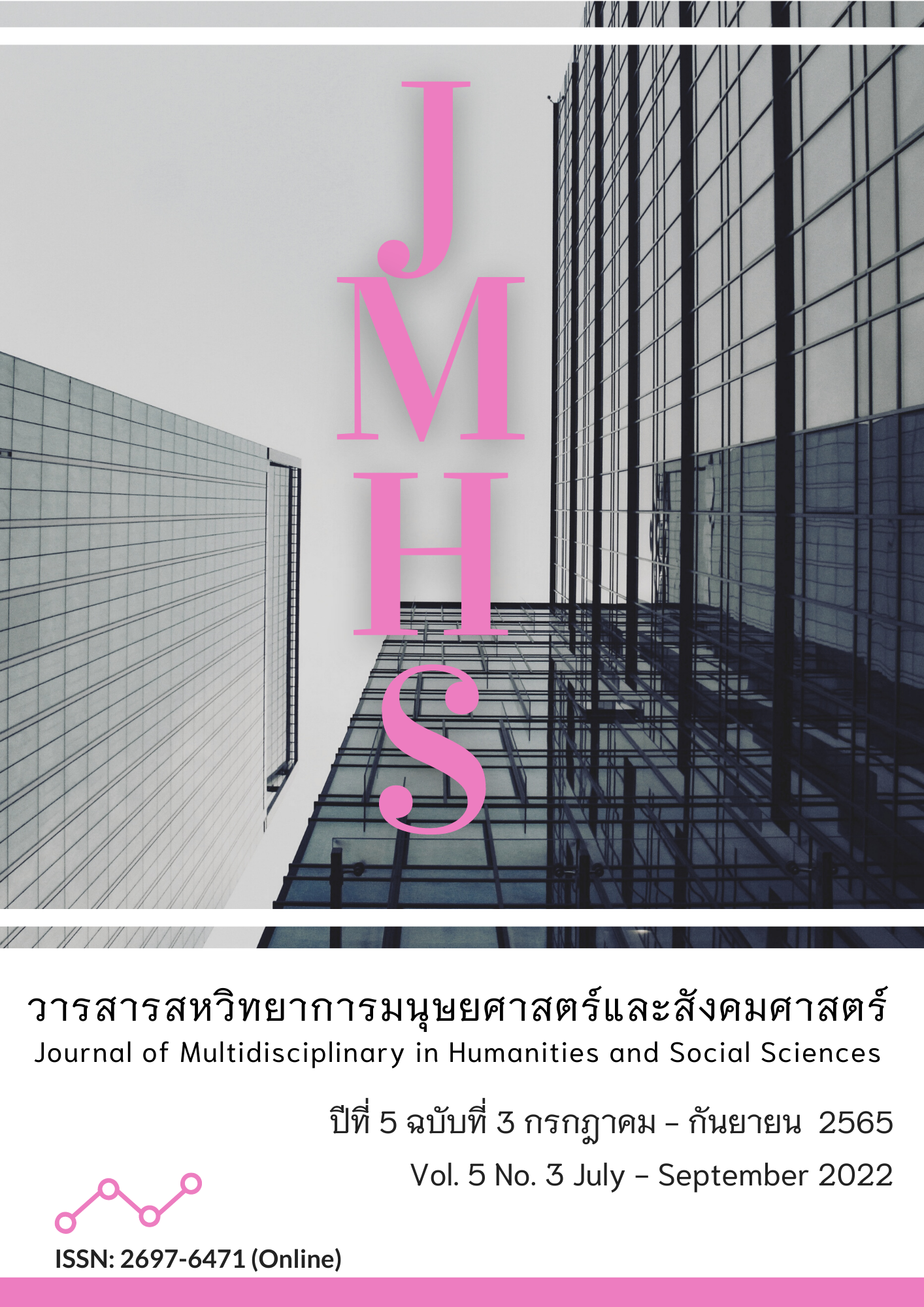Sirisuk Smart Market: livelihood on the new normal in sustainable development goal of Surat Thani Municipality, Surat Thani Province, Thailand
Main Article Content
Abstract
The purpose of this article was to study the performance of Sirisuk Smart Market: livelihood on the new normal in the sustainable development goal of Surat Thani Municipality, Surat Thani Province, Thailand. According to the conceptual framework related to sustainable development, from the study of the theory, a literature review, and interviews with 29 representatives of various groups involved in the operation of Smart Market, which were used to analyze the content and write a descriptive description. The results of the study found that Surat Thani Municipality is a large local government organization with high performance with a population of more than 130,000 representatives, and Smart Market is a project that the people of the Sirisuk community have participated in together according to the principle of participation and receive benefits. In addition, good governance principles are applied in operations. By focusing on working with “law, morality, transparency, participation, sense of responsibility, and worthiness.”
Article Details

This work is licensed under a Creative Commons Attribution-NonCommercial-NoDerivatives 4.0 International License.
Views and opinions appearing in the Journal it is the responsibility of the author of the article, and does not constitute the view and responsibility of the editorial team.
References
Aroonsrimorakot, S., & Vajaradul, Y. (2016). UN Sustainable Development Goals: 17 Aspects for Future World. Interdisciplinary Research Review, 11(3), 1–7. https://doi.org/10.14456/jtir.2016.3
Department of Community Development. (1984). Community Development. Bangkok: Department of Community Development.
Office of National Higher Education Science Research and Innovation Policy Council. (2022). Direct Poverty Eradication. Retrieved April 29, 2022, from https://www.nxpo.or.th/th/targeted-poverty-eradication.
Kitchawengkul, A. (2018). Edward Damming Concepts and Theories. Retrieved April 29, 2022, from http://www.vatchareeporndba.blogspot.com/2012/10/11-edward-damming.html
Kuakul, Y. (2017). The Development of Academic Administration Model of Islamic Private Schools, Province Southern Gentlemen to Build Students Towards Perfect Humanity. Songkla: Prince of Songkla University Pattani Campus.
Kunsuwan, K. (2013). New Concepts for the New Millennium. Chophayom Journal, 23, 163–173. Retrieved from https://so01.tci-thaijo.org/index.php/ejChophayom/article/view/8433
Masae et al. (2007). Modernization and Rural Livelihood Adaptation. Conference in Southern Thailand English Language Teaching/Cultural Change, (pp. 76-77). Industrial and Finance Cooperation of Thailand.
Ministry of Education. (1997). Educational Reform of the Office of the Education Commission. Bangkok: National Council of Thailand.
Muhamad, C. (2010). The Strategic Adjustment of Small-Scaled Fisheries Muslim Group in living with Resource Scarcity: Case Study of Seashore Communities in Khu Tao Subdistrict, Hat Yai District, Songkhla Province(Master’s Thesis). Prince of Songkhla University.
Muhamad, C., Boonprakan, K., & Sirisatidkid, C.S. (2020). “SongKhao, NuengLae, SaeRern”: The Fishery Resource Co-Management in HuaKhao Community, HuaKhao Sub-District, Singhanakhon District, Songkhla Province. Journal of Social Development, 22(1), 82–99.
Netkaew, K. (2018). Online marketing via Facebook of women's fashion clothing stores that affects the response process of consumers(Master’s Thesis). National Institute of Development Administration.
Ontam, N. (2019). PDCA (Deming Cycle) Management Techniques. Journal of Association of Professional Development of Educational Administration of Thailand (JAPDEAT), 1(3), 39-46. Retrieved from https://so04.tci-thaijo.org/index.php/JAPDEAT/article/view/250846
Phrakhrusophonpariyattayanukit., Srikhruedong, S., & Ragkhanto, S. (2021). Life Skills to COVID-19 Epidemic Situation Based on Buddhist Psychology. Journal of MCU Humanities Review, 7(2), 399–411.
Phrasongsaksantanong., & Kotsupho, P. (2021). COVID-2019: Pathway, Dhammapath, A New Normalof the Buddhists in Thai Society. Journal of MCU Ubon Review, 6(3), 947-960.
Ponsri, S. (2004). Theories and Principles of Community Development. Bangkok: Odeon Store.
Prasamuhchanchai Yanajato (Petdee). (2019). The Development of Monks Through Deming Process for Development of the Minds of Inmates According to Buddhism. Journal of Graduate Review Nakhon Sawan Buddhist College, 7(2), 275-286. Retrieved from https://so02.tci-thaijo.org/index.php/jgsnsbc-journal/article/view/240267/163646
Siriwong, S. (2020). N.A.V.Y. Strategies for Change in the New Normal Nursing Education. Royal Thai Navy Medical Journal, 47(3), 747–760. Retrieved from https://he01.tci-thaijo.org/index.php/nmdjournal/article/view/246284
Supupatham, N. (2015). Theory and Principles of Community Development. Chanthaburi: Faculty of Humanities and Social Sciences, Rambhai Barni Rajabhat University.
Surat Thani Municipality. (2022). Local Development Strategy. Retrieved April 29, 2022, from https://www.suratcity.go.th.
Sustainable development Solution Network. (2021). Sustainable Development Report: SDR 2021. Retrieved April 29, 2022, from https://www.sdgmove.com/2021.
UN, Development of Economic and Social Affair. (1960). Community Development and Related Service. New York: United Nation Republication.
United Nation. (2022). Sustainable Development Goals (SDGs) and Disability. Retrieved April 29, 2022, from https://www.un.org/development.
Wasi. P. (1998). On the New Road of Health Promotion: Life and Society. Bangkok: Mor Chao Ban.
Walaisathien, P. et al. (2003). Process and Techniques of Developer’s Work. Bangkok: The Thailand Research Fund.
Watkaew, M. (1992). Theories and Principles of Community Development. Phetchaburi: Faculty of Humanities and Social Sciences Phetchaburi Teachers College.


